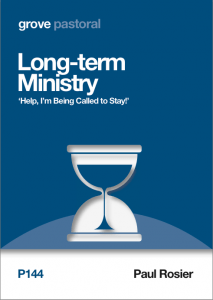 The latest Grove Pastoral booklet is P 144 on Long-term Ministry by Paul Rosier, a Baptist minister. It is a fascinating exploration of the advantages and challenges of both long-term and short-term ministry in the same place.
The latest Grove Pastoral booklet is P 144 on Long-term Ministry by Paul Rosier, a Baptist minister. It is a fascinating exploration of the advantages and challenges of both long-term and short-term ministry in the same place.
It starts with some rather startling statistics about the frequency of change in jobs in general and ministry in particular.
Change is endemic in every area of life—on average we move house every eight years, change our car every four and a half years and change job every two years. Christian ministry is not immune to change. The average duration of a Church of England ministry is seven years, and in the Baptist Union it is six and a half years. Only one in nine Baptist ministers stays in a particular local ministry beyond 12 years.
UK churches are not unique in experiencing such upheaval. The American Lutheran Church sees a 20% annual turnover of clergy, with pastors moving on average every four years; a Southern Baptist pastor moves on average every 18 to 24 months; 85% of US seminary graduates entering the ministry leave within five years; 90% of all US pastors will not last to retirement.
The church may mirror society at large, which appears restless in the pursuit of the new, the attractive and lively, quickly discarding something when it is showing signs of weariness. Under a welter of technological and cultural developments, society demands freshness, innovation and renewal. Those who stay long term in a job, task or location are regarded not with admiration but suspicion and pity—there is a thin grey line between commitment and staleness. Whatever the culture, rapid ministerial turnover may impact the welfare of the churches and their ministers. Research on church growth shows that it is not until a minister has served for five to ten years in his church that a bias towards growth becomes evident.
This mirrors the conclusions of American research defining the most productive years of a local ministry—the fifth and seventh years (Lyle Schaller), the third to fifteenth years (George Barna), and the fifth to fourteenth years (London and Wiseman). Why, therefore, do most ministers leave their local ministry during these periods, usually in the earlier years? What are the benefits and drawbacks of long-term and short-term ministry? Do the merits of either outweigh the drawbacks? (pp 3–4)
There follows a really interesting exploration of the biblical material. In the OT, there is a noticeable difference between various ‘rulers’ of the people—Moses, Joshua, the judges and the kings—who were appointed for life and usually had long service, and ‘prophets’ who were more detached, and were often commissioned for particular tasks. In the NT, there were social and historical reasons why we don’t see much discussion of long-term ministry—after all, most of the NT itself only covers around a 40-year time period. But here, Rosier hits on a key issue which might shape the length of ministry in one place—the importance of relationships.
The foregoing examples illustrate the crucial nature of relationships for effective ministry. Scripture is suffused with relationships—from Adam and Eve in the Garden of Eden, through Cain and Abel, Noah, Abraham, Isaac and Jacob to Moses and beyond—and strong relationships were key to life and survival. In the New Testament, relationships matter—from Jesus to and with his disciples, to the early church, Paul and the developing churches of the known world. Without meaningful relationships, ministry becomes almost impossible. The relationship of the individual to God is the key to interpersonal relationships. Virtually the whole of Jesus’ prayer in John 17—for himself, for his disciples and for all believers—is founded on the relationship of the Son to the Father.
Relationships demand depth and commitment for ministry to be effective. Jesus spoke of his relationship to his followers as of a shepherd to his sheep (John 10.14–15), an image which Paul repeated in his parting words to the Ephesian elders: ‘Keep watch over yourselves and all the flock…be shepherds of the church of God… (Acts 20.28).’…
As in all relationships, time matters. Too often, the temptation is to walk away from situations of conflict, leaving them unresolved. Sadly, this happens in conflicts between ministers and churches; instead of staying to see conflicts resolved and relationships strengthened, the minister is tempted to retreat to seek solace and a new ministry elsewhere. This then undermines the very nature of ministry and the integrity of the gospel. (pp 9–11)
In the light of this, he offers some fascinating insights from the middle ages, and Benedict’s concern about people moving on too quickly from one place to another. In times of social upheaval, the stability in relationships which long-term ministry involves are particularly important.
Rosier then explores the advantages and disadvantages of long- and short-term ministry. The advantages of long-term ministry include:
The opportunity to develop a greater depth in ministry. Since for most congregations the minister has been called from elsewhere, the minister is only temporary—until they move to something different/bigger/better. It takes time to build relationships, and these are best built through shared service and experiences. Ministers need reminding that what really impacts people is not dynamic preaching or astonishing leadership, but love, patience, humility and grace—it is not what you do but what you are that counts…
A greater effectiveness in pastoral leadership. It takes time for people to trust a minister. Congregations can be very protective of their churches, and a sense that the minister is ‘one of us’ can take a long time to develop. Not until that accolade is won will the church gladly accept changes. It may take some years for the minister truly to develop a sense of ministry which embraces, comes from and includes the people…
Stability for ministry, allowing long-term projects to move to completion, and allowing staff and people to get on with ministry without the repeated distraction of a new minister. The church does not have to cope continually with a change of leadership styles—the church leadership can work together without having to repeat team-building exercises…
Possibilities of greater personal and spiritual growth for both minister and people. A minister needs to grow with the people. The people need to see and be encouraged by a genuine example of God’s grace at work. Such growth will never happen overnight!…
The development of meaningful community ministry. Some see community minis- try as vital to the church’s life and well-being, and devote much energy to it. Others see it as an escape from the drudgery of church life and will not sup- port their minister in this. The long-term minister discovers that meaningful ministry in the community is not only possible but desirable…
Personal and special benefits for minister and family. A long ministry enables children to complete their education unhindered by a move of school. Rarely does such a change go smoothly—some children find themselves adapting to different curricula or examination regimes and, as so often in life, it is the children who suffer most from adults’ decisions. Settlement in one place is also good for peer relationships, within and beyond the minister’s family. (pp 13–14)
One of the most fascinating things Rosier found from his research is that ministers who self-appointed found it easier to stay long term, whereas those appointed by their denominational authorities tended to leave early, which suggests a key dynamic in relation to commitment.
The final chapter offers a range of strategies for those staying long term in one place, addressing the potential disadvantages—how to keep fresh, maintain trust, continue growing spiritually, soliciting feedback from the congregation, and watching for burnout. Rosier ends with a very positive personal reflection:
 My local ministries have been for three, six and twenty-five years respectively. Reflecting on these, I am now convinced of the value of long-term one-location ministry, should God clearly call you to such ministry. Of course, factors such as personality type, temperament, church needs, pastoral orientation and personal energy are important, alongside the needs of the minister’s family. An overarching sense of God’s calling is absolutely vital.
My local ministries have been for three, six and twenty-five years respectively. Reflecting on these, I am now convinced of the value of long-term one-location ministry, should God clearly call you to such ministry. Of course, factors such as personality type, temperament, church needs, pastoral orientation and personal energy are important, alongside the needs of the minister’s family. An overarching sense of God’s calling is absolutely vital.
What cannot be ignored, however, is the realization that ministry is hard work, frequently disappointing and frustrating, sometimes lonely and unrecognized. However, for those who endure long term the rewards are enormous, not just for the minister but also for the people. (p 26)
This is a fascinating exploration, engaging with a wide range of ideas. It would be a valuable read for anyone wondering ‘Is it time to move on?’ and perhaps transforming the question to ‘Would it be good to stay?’
You can order the booklet, post-free, from the Grove website.
Follow me on Twitter @psephizo
Much of my work is done on a freelance basis. If you have valued this post, would you consider donating £1.20 a month to support the production of this blog?




























Thanks for highlighting this Ian. Over the past few years I’ve become convinced that long-term ministry is what I should be aiming for (and what more people in the church should be aiming for) – partly through thinking about the statistics you mention. If you look at the biggest churches in the UK, these have mostly had one person as the pastor over the years. My previous church the incumbent was there 18 years. In my church now, the incumbent has been there nearly 20 years – and it shows (in a good way).
It’s no surprise that the church isn’t growing much if the majority of priests move on after about 5 years!
Phill, that’s interesting. I think the booklet is good on identifying the *dangers* of staying a long time too, and recommending ways of addressing that.
It of course all raises interesting questions about what happens when bishops want to deploy clergy and tell them where to do. I was struck by the statistics around that…
I’ve been sixteen years at St. Margaret’s, Edmonton. I don’t think my ministry really started bearing long-term fruit until after about year seven.
I’ve had two longer-term ministries – one of eight and a half years, and now sixteen at St. Margaret’s. Interestingly, in both of them I hit a wall at around year six, and had to struggle through. The wall was hard to describe; perhaps it was the realization that I’d tried all my good ideas, and while they’d had some effect, they hadn’t been the salvation of the congregation. In both instances, once I managed to get through that wall, ministry became a very different experience. In the first case, I mainly got through by dint of determination, along with paying greater attention to boundaries and my own spiritual refreshment. In the second, a three month sabbatical gave me an opportunity to reinvent myself a little.
Despite the dry spells, I wouldn’t go back to short-term ministry. The benefits, in terms of relationships, trust, knowledge of peoples’ lives etc. are just too great to ignore.
In purely secular roles (IT) I have had similar experiences as you Tim – one job lasting 7 years and one 18 years – and in both cases a relationships crisis at about 6 years in. The data suggests that I dealt better with the second relationships crisis than with the first one – and with all the benefits that you have highlighted Ian. Surely what you have written applies to life, not just to “ministry.” And maybe even to lay church membership – now there’s a thought.